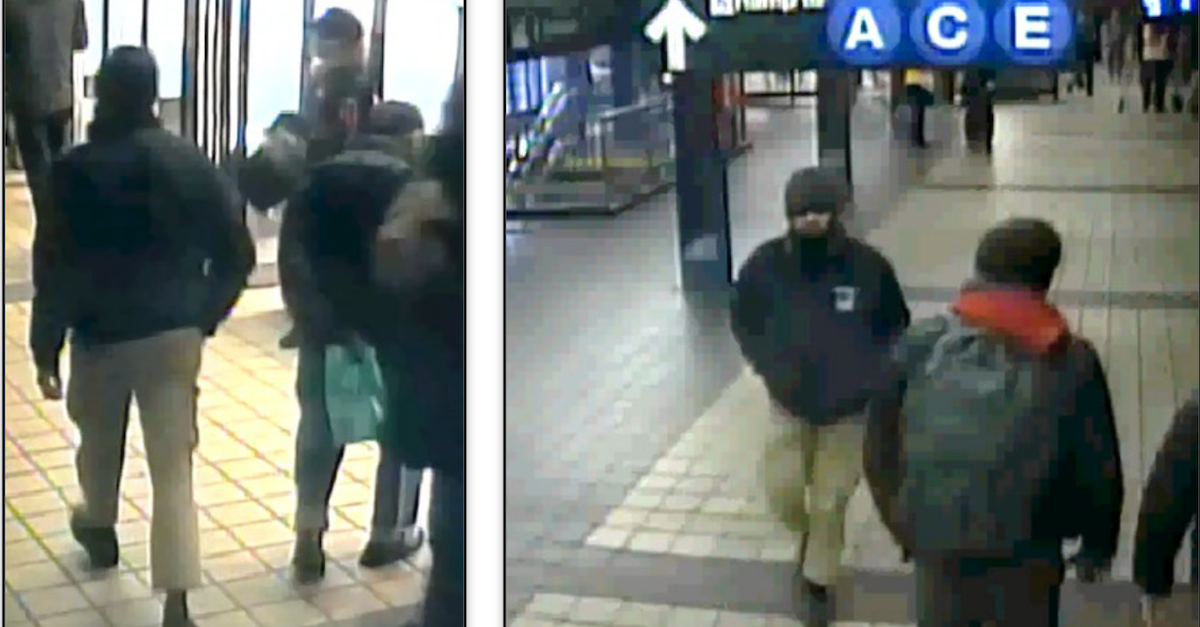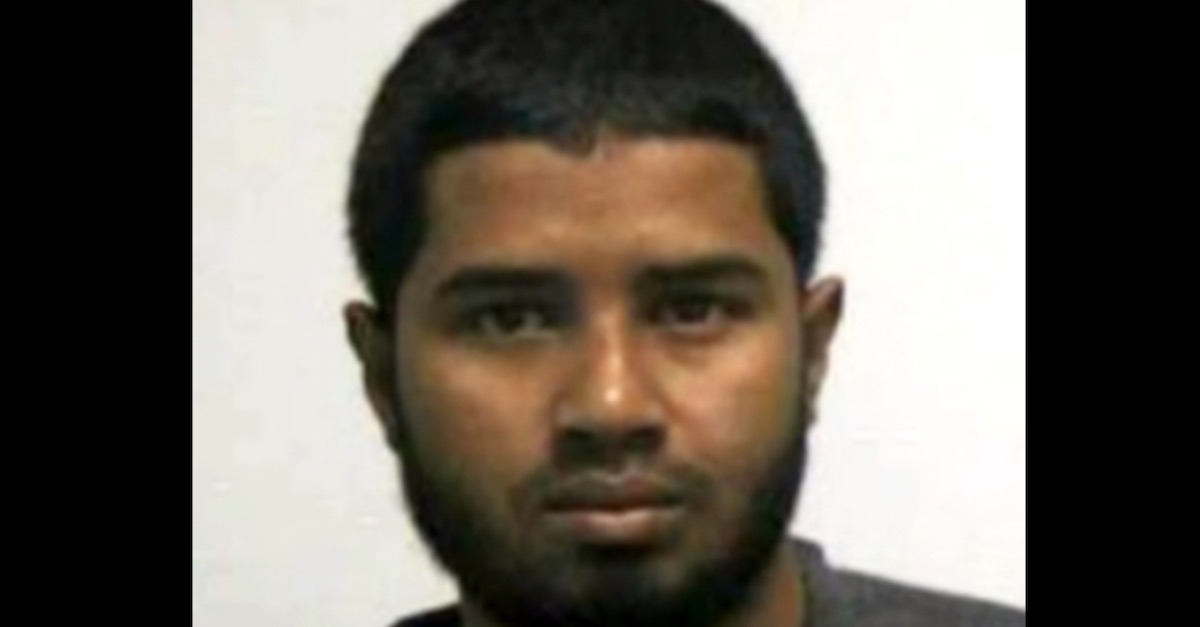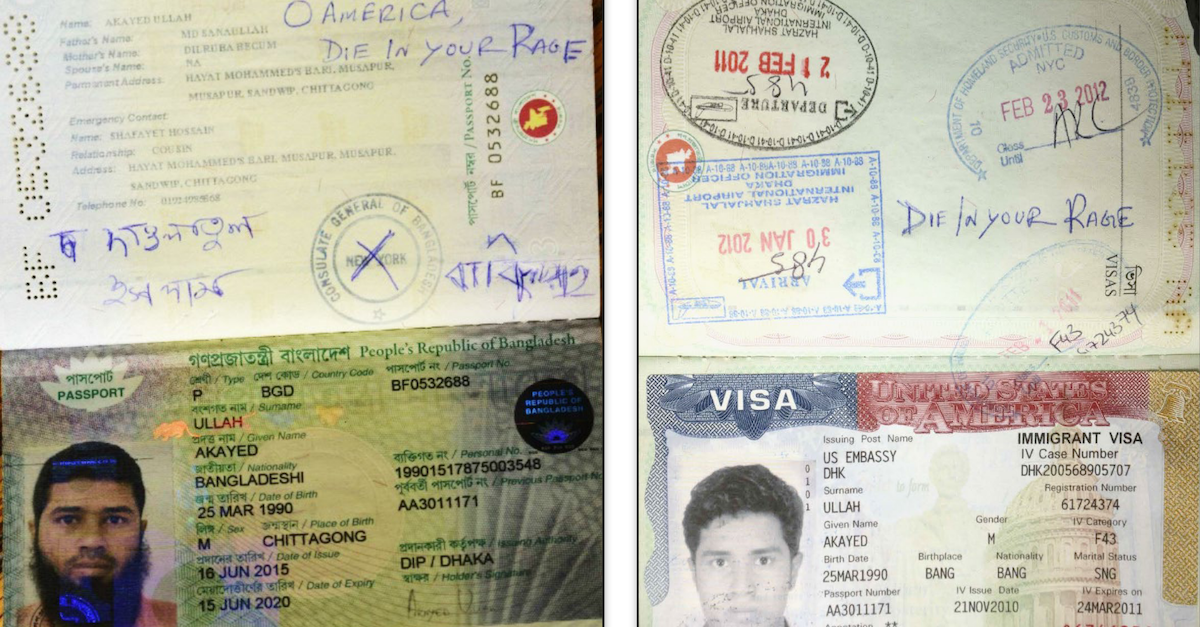
Prosecutors included these still frames from New York City subway surveillance in convicted pipe bomber Akayed Ullah’s sentencing memo.
Once the blustering terrorist who scrawled “O AMERICA, DIE IN YOUR RAGE” in his passport before detonating a pipe bomb inside the New York City subway for the Islamic State group, Akayed Ullah renounced his former ideology in federal court and described the indiscriminate targeting of civilians as “evil.”
That about-face was not enough to spare Ullah the stiffest sentence available for his acts: The 31-year-old will spend the rest of his life behind bars, a federal judge ruled on Thursday.
“My sentence will be more humane, and less draconian, than the sentence you were going to impose on you,” U.S. District Judge Richard J. Sullivan declared, adding that the would-be suicide bomber would have made his son an orphan had his attack on the Times Square subway station succeeded in December 2017.

During an emotional 90-minute hearing, Sullivan said that his “heart breaks” for Ullah’s family, which was blindsided by the attack.
“They are innocent victims of this crime,” Sullivan added. “They had the courage to come here to this country to build a better life for themselves.”
A Muslim immigrant from Bangladesh, Ullah’s attack toward the start of the Donald Trump presidency had been used to stoke fear against green card recipients. Sullivan, who was appointed by Trump to the Second Circuit Court of Appeals, presided over Ullah’s case when he was a district judge and praised the immigrant family for providing a clearer picture of the man behind the pipe bomb.
“You are not disposable,” Sullivan said, addressing Ullah directly.
“It has to be acknowledged that you did not extend those considerations to others,” the judge added, describing his unsuccessful aim to “indiscriminately” kill men, women and children. “You did not think about the humanity of the people that you were hurting. It just didn’t occur to you.”
After being whisked to the hospital following the attack, Ullah waived his Miranda rights and told authorities he carried out the attacks for the Islamic State group. Prosecutors quote him telling authorities that he chose a busy weekday morning for his attack because “there would be more people to terrorize,” that he filled his bomb with screws to inflict “maximum damage,” and that he knew people might die.
Quoting anonymous officials, CNN reported that Ullah claimed to have carried out the attack in response to Israel’s actions in Gaza, and authorities found a passport with angry messages toward the United States.

Facing sentencing, Ullah no longer defended his previous ideology of violence against civilians, which he now calls “evil.”
“Your honor, what I did in Dec. 11, it was wrong,” Ullah told the court. “I can tell you from the bottom of my heart that I’m deeply sorry for what I did.”
“I apologize to NYC, to law enforcement and to this country,” he added later. “I never support harming innocent people. I do not support harming innocent people, and I will not support harming innocent people. What I was doing was wrong.”
His defense attorney Amy Gallicchio painted his acts as the result a “deeply troubled soul” in the grip of “depression at its worst,” citing the diagnosis of a licensed social worker.
Under the statute of his convictions, the lightest sentence Ullah could have received was 35 years imprisonment, which Gallicchio argued would have sent a message that acts like her client’s would be punished harshly.
“Why isn’t 35 years deterring generally?” Gallicchio asked, calling that period of time “incapacitating” for her 31-year-old client.
Nobody died in the attacks, but Assistant U.S. Attorney Rebekah Donaleski noted that there were victims.
“Not only did Ullah disrupt the lives of hundreds of thousands of New Yorkers on the morning of his bombing, and cause the shutdown of the busiest subway station in New York City, he caused lasting physical and emotional damage to his victims,” she wrote in a sentencing brief. “It is nothing short of miraculous that Ullah did not kill anyone as he had hoped: his bomb was certainly capable of doing so, and he chose a location within the subway station that amplified the effects caused by the bomb’s detonation.”
None of those victims spoke at Ullah’s sentencing, but two submitted statements to the court: David Wall and Veronica Chavez, who testified at his trial.
After the detonation, Wall testified that he suffered “severe concussion from the explosive waves and suffered from shock,” and shrapnel penetrated his leg. Chavez said that she lost a job because of “frayed nerves” from the attacks.
“Ms. Chavez sees a therapist for the trauma she experienced as a result of the attack, and tragically explains that ‘[i]n a sense, [her two children] have lost me, because when I hear a loud noise I get distressed and upset,'” prosecutors wrote.
Ullah also apologized to them during his statement to the court.
(Screenshots from a Justice Department brief)
Have a tip we should know? [email protected]